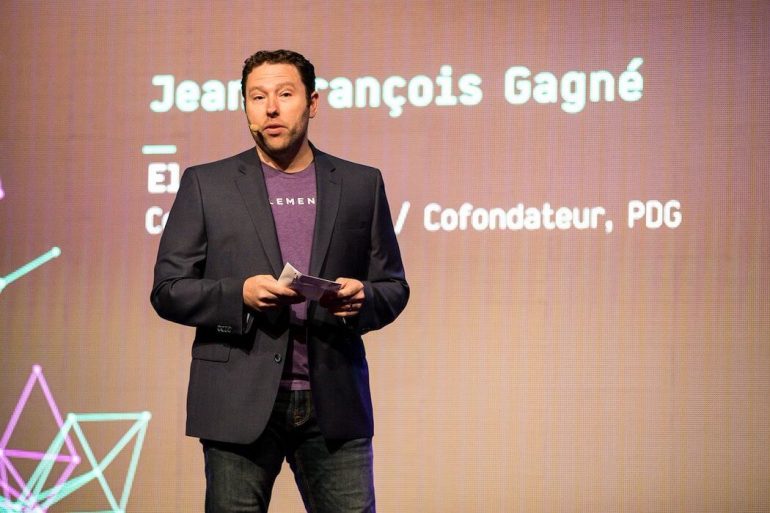The #ElevateAI Stage (programmed by BetaKit) was filled with panels, keynotes, and lightning talks highlighting what’s new and next in the Canadian tech ecosystem. From attracting talent to tackling IP issues, the day included founders, funders, and corporates sharing their view on keeping Canada’s leading AI.
“We have to build a lot of that stuff, so that took a lot of energy and time.”
JF Gagné, CEO of Element AI, was among those in the commercialization conversation, where panelists talked about barriers and solutions to bring nascent technology to market. During the panel, Gagné talked about the challenges of scaling Element AI, and talked to BetaKit afterwards about what’s next.
Gagné said that one of the challenges of building Element AI, which recently raised a $200 million Series B, is working with partners that were not using their data efficiently, and tailoring the tool according to their needs.
At the same time, he said the infrastructure to scale an AI model doesn’t already exist, such as annotating and monitoring the data.
“We have to build a lot of that stuff, so that took a lot of energy and time,” he said. “It’s a key learning, and this is something that we haven’t solved yet.”
The challenges don’t end there. When a potentially valuable product or tool is created with a partner, there’s the IP issue. Partners that have gained value do not want to risk sharing data and information and having competitors learn from it.
“We faced incredible resistance from the market to let us build a generic model that would then be shared and productized,” said Gagné. “When you get into the real money maker use case like the ones that underpin the business model of a retailer or a manufacturing company, they’re not gonna let you reuse that IP. So finding the right threshold of what is generic, what is a product, what is the platform, and what is owned by a customer is still a work in progress.”
Recently, Element AI announced the launch of its first standalone product, an insurance tool that uploads data from insurance documents directly into an insurers’ system of records, while flagging missing information and items for review. That tool was developed with Gore Mutual, an insurance company, which announced a partnership with Element AI in April 2019. The tool was created using Gore Mutual proprietary data, and both companies worked together to build the necessary data sets and learning models.
In this case and others, Gagné said it’s a matter of negotiating the right terms. “In terms of what providers keep and what customers keep, it requires weeks and weeks and weeks of evangelization to gravitate towards equilibrium,” he said, adding that the company has to deal with legal and procurement processes that can delay the process.
“We have a very open conversation, and we’re adjusting as we go,” he said.
Throughout the conversation, Gagné stressed that Element AI is leading a completely new category unlike traditional software, making its path to commercialization more difficult and time-consuming. The company has faced questions about its path to profitability, with The Globe and Mail reporting that the startup has faced high operational costs and minimal revenue. Recently, The Logic reported that the CEO may be planning to leave the company.
On the latter point, Gagné responded plainly: “I’m not leaving, [it’s just] rumours.”
Asked whether Element AI’s long-term strategy is to build products with partners or start to launch its own products, Gagné said it’s both. On launching its own products, Gagné said the company has been working on the infrastructure for building these tools for the last year and a half. The $200 million investment will go towards continue to hire and develop its AI products.
“It’s now coming to maturity, and we’ll be releasing them in the market. So expect to see more soon.”


